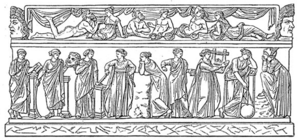
Alcaeus of Mytilene was a lyric poet from the Greek island of Lesbos who is credited with inventing the Alcaic stanza. He was included in the canonical list of nine lyric poets by the scholars of Hellenistic Alexandria. He was a contemporary of Sappho, with whom he may have exchanged poems. He was born into the aristocratic governing class of Mytilene, the main city of Lesbos, where he was involved in political disputes and feuds.

Sappho was an Archaic Greek poet from Eresos or Mytilene on the island of Lesbos. Sappho is known for her lyric poetry, written to be sung while accompanied by music. In ancient times, Sappho was widely regarded as one of the greatest lyric poets and was given names such as the "Tenth Muse" and "The Poetess". Most of Sappho's poetry is now lost, and what is extant has mostly survived in fragmentary form; only the Ode to Aphrodite is certainly complete. As well as lyric poetry, ancient commentators claimed that Sappho wrote elegiac and iambic poetry. Three epigrams formerly attributed to Sappho are extant, but these are actually Hellenistic imitations of Sappho's style.
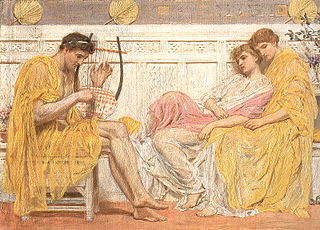
Bacchylides was a Greek lyric poet. Later Greeks included him in the canonical list of Nine Lyric Poets, which included his uncle Simonides. The elegance and polished style of his lyrics have been noted in Bacchylidean scholarship since at least Longinus. Some scholars have characterized these qualities as superficial charm. He has often been compared unfavourably with his contemporary, Pindar, as "a kind of Boccherini to Pindar's Haydn". However, the differences in their styles do not allow for easy comparison, and translator Robert Fagles has written that "to blame Bacchylides for not being Pindar is as childish a judgement as to condemn ... Marvell for missing the grandeur of Milton". His career coincided with the ascendency of dramatic styles of poetry, as embodied in the works of Aeschylus or Sophocles, and he is in fact considered one of the last poets of major significance within the more ancient tradition of purely lyric poetry. The most notable features of his lyrics are their clarity in expression and simplicity of thought, making them an ideal introduction to the study of Greek lyric poetry in general and to Pindar's verse in particular.

Archilochus was a Greek lyric poet of the Archaic period from the island of Paros. He is celebrated for his versatile and innovative use of poetic meters, and is the earliest known Greek author to compose almost entirely on the theme of his own emotions and experiences.
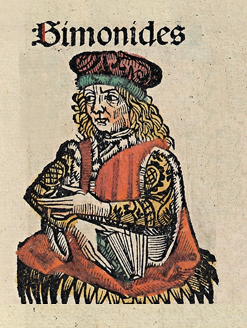
Simonides of Ceos was a Greek lyric poet, born in Ioulis on Ceos. The scholars of Hellenistic Alexandria included him in the canonical list of the nine lyric poets esteemed by them as worthy of critical study. Included on this list were Bacchylides, his nephew, and Pindar, reputedly a bitter rival, both of whom benefited from his innovative approach to lyric poetry. Simonides, however, was more involved than either in the major events and with the personalities of their times.
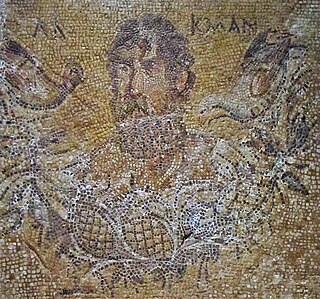
Alcman was an Ancient Greek choral lyric poet from Sparta. He is the earliest representative of the Alexandrian canon of the Nine Lyric Poets. He wrote six books of choral poetry, most of which is now lost; his poetry survives in quotation from other ancient authors and on fragmentary papyri discovered in Egypt. His poetry was composed in the local Doric dialect with Homeric influences. Based on his surviving fragments, his poetry was mostly hymns, and seems to have been composed in long stanzas made up of lines in several different meters.
Ibycus was an Ancient Greek lyric poet, a citizen of Rhegium in Magna Graecia, probably active at Samos during the reign of the tyrant Polycrates and numbered by the scholars of Hellenistic Alexandria in the canonical list of nine lyric poets. He was mainly remembered in antiquity for pederastic verses, but he also composed lyrical narratives on mythological themes in the manner of Stesichorus. His work survives today only as quotations by ancient scholars or recorded on fragments of papyrus recovered from archaeological sites in Egypt, yet his extant verses include what are considered some of the finest examples of Greek poetry.

Pindar was an Ancient Greek lyric poet from Thebes. Of the canonical nine lyric poets of ancient Greece, his work is the best preserved. Quintilian wrote, "Of the nine lyric poets, Pindar is by far the greatest, in virtue of his inspired magnificence, the beauty of his thoughts and figures, the rich exuberance of his language and matter, and his rolling flood of eloquence, characteristics which, as Horace rightly held, make him inimitable." His poems can also, however, seem difficult and even peculiar. The Athenian comic playwright Eupolis once remarked that they "are already reduced to silence by the disinclination of the multitude for elegant learning". Some scholars in the modern age also found his poetry perplexing, at least until the 1896 discovery of some poems by his rival Bacchylides; comparisons of their work showed that many of Pindar's idiosyncrasies are typical of archaic genres rather than of only the poet himself. His poetry, while admired by critics, still challenges the casual reader and his work is largely unread among the general public.

Modern lyric poetry is a formal type of poetry which expresses personal emotions or feelings, typically spoken in the first person.

Theognis of Megara was a Greek lyric poet active in approximately the sixth century BC. The work attributed to him consists of gnomic poetry quite typical of the time, featuring ethical maxims and practical advice about life. He was the first Greek poet known to express concern over the eventual fate and survival of his own work and, along with Homer, Hesiod and the authors of the Homeric Hymns, he is among the earliest poets whose work has been preserved in a continuous manuscript tradition. In fact more than half of the extant elegiac poetry of Greece before the Alexandrian period is included in the approximately 1,400 lines of verse attributed to him, though several poems traditionally attributed to him were composed by others, e.g. Solon and Euenus. Some of these verses inspired ancient commentators to value him as a moralist yet the entire corpus is valued today for its "warts and all" portrayal of aristocratic life in archaic Greece.

Tyrtaeus was a Greek elegiac poet from Sparta whose works were speculated to fill five books. His works survive from quotations and papyri, and include 250 lines or parts of lines. He wrote at a time of two crises affecting the city: a civic unrest threatening the authority of kings and elders, later recalled in a poem named Eunomia, where he reminded citizens to respect the divine and constitutional roles of kings, council, and demos; and the Second Messenian War, during which he served as a sort of "state poet", exhorting Spartans to fight to the death for their city. In the 4th century BC, when Tyrtaeus was an established classic, Spartan armies on campaign were made to listen to his poetry. The Suda states that he wrote martial songs; these were important in Spartan festivals and were done through anapaestic and iambic chants that accompanied armed dances and processions.
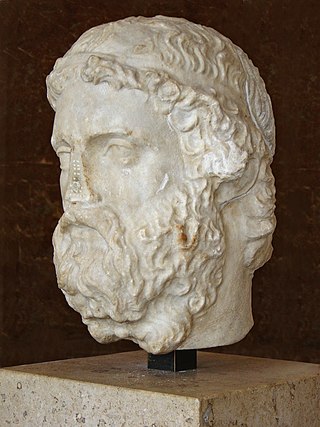
Anacreon was a Greek lyric poet, notable for his drinking songs and erotic poems. Later Greeks included him in the canonical list of Nine Lyric Poets. Anacreon wrote all of his poetry in the ancient Ionic dialect. Like all early lyric poetry, it was composed to be sung or recited to the accompaniment of music, usually the lyre. Anacreon's poetry touched on universal themes of love, infatuation, disappointment, revelry, parties, festivals, and the observations of everyday people and life.

Timocreon of Ialysus in Rhodes was a Greek lyric poet who flourished about 480 BC, at the time of the Persian Wars. His poetry survives only in a very few fragments, and some claim he has received less attention from modern scholars than he deserves. He seems to have composed convivial verses for drinking parties. However, he is remembered particularly for his bitter clashes with Themistocles and Simonides over the issue of his medizing, for which he had been banished from his home around the time of the Greek victory at the Battle of Salamis. He was also an athlete of some distinction and reputedly a glutton.
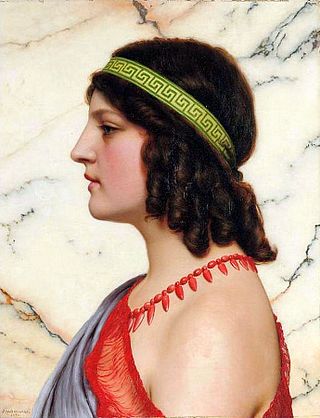
Praxilla, was a Greek lyric poet of the 5th century BC from Sicyon on the Gulf of Corinth. Five quotations and three paraphrases from her poems survive. The surviving fragments of her work come from both religious choral lyric and drinking songs (skolia); the three paraphrases are all versions of myths. Various social contexts have been suggested for Praxilla based on this range of surviving works, including that her poetry was in fact composed by two different authors; that Praxilla was a hetaira (courtesan); that she was a professional musician; or that the drinking songs derive from a non-elite literary tradition rather than being authored by a single writer. Praxilla was apparently well-known in antiquity: she was sculpted in bronze by Lysippus and parodied by Aristophanes.
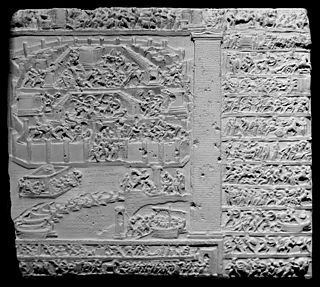
Stesichorus was a Greek lyric poet native of today's Calabria. He is best known for telling epic stories in lyric metres, and for some ancient traditions about his life, such as his opposition to the tyrant Phalaris, and the blindness he is said to have incurred and cured by composing verses first insulting and then flattering to Helen of Troy.

Byzantine literature is the Greek literature of the Middle Ages, whether written in the territory of the Byzantine Empire or outside its borders. It forms the second period in the history of Greek literature after Ancient Greek literature.
Aeolic verse is a classification of Ancient Greek lyric poetry referring to the distinct verse forms characteristic of the two great poets of Archaic Lesbos, Sappho and Alcaeus, who composed in their native Aeolic dialect. These verse forms were taken up and developed by later Greek and Roman poets and some modern European poets.
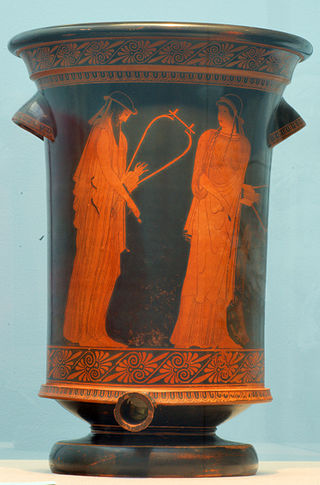
Greek lyric is the body of lyric poetry written in dialects of Ancient Greek. It is primarily associated with the early 7th to the early 5th centuries BC, sometimes called the "Lyric Age of Greece", but continued to be written into the Hellenistic and Imperial periods.
Choral poetry is a type of lyric poetry that was created by the ancient Greeks and performed by choruses. Originally, it was accompanied by a lyre, a string instrument like a small U-shaped harp commonly used during Greek classical antiquity and later periods. Other accompanying instruments in later years included other string instruments such as the kithara, barbiton, and phorminx, as well as wind instruments such as the aulos, a double-reeded instrument similar to an oboe.
